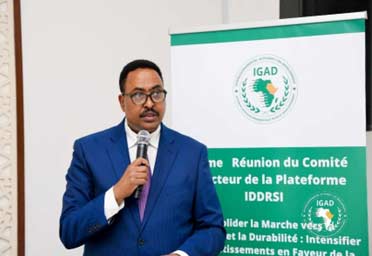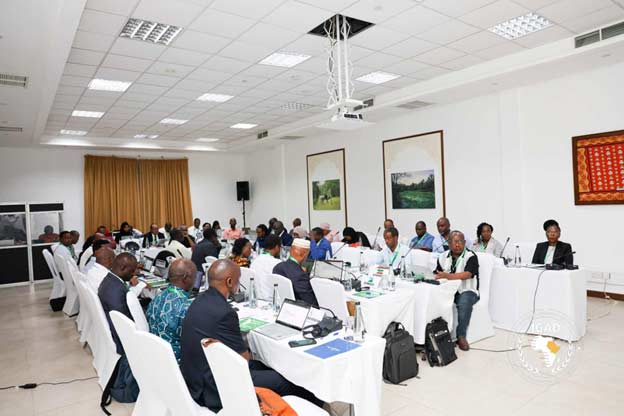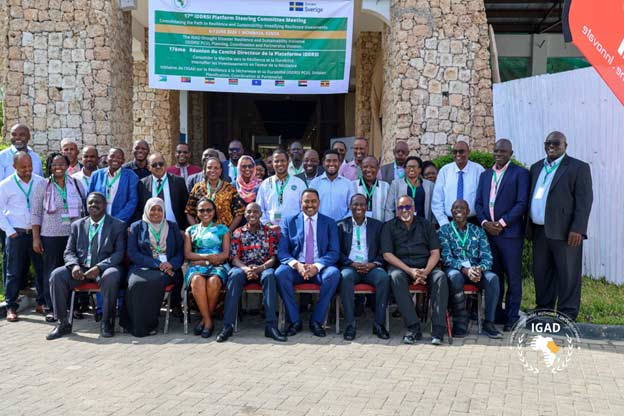Strengthening Resilience in the IGAD Region: Insights from the 17th IDDRSI Platform Steering Committee Meeting, 6-7 June, Mombasa, Kenya
The recent convening of the 17th IGAD Drought Disaster Resilience and Sustainability Initiative (IDDRSI) Platform Steering Committee underscored critical challenges and advancements in addressing drought resilience and climate-related issues across the region. Held under the leadership of H.E. Hon Kello Harsama, Principal Secretary of the State Department of ASALs, EAC and Regional Development, the Republic of Kenya; H.E. Dr Workneh Gebeyehu, the Executive Secretary of IGAD and H.E. Mr Mohamed Abdi Ware, Deputy Executive Secretary of IGAD, the meeting brought together key stakeholders to deliberate on pressing issues affecting IGAD Member States.
Objectives of the 17th IDDRSI Platform Steering Committee Meeting:
- Review the progress of resilience projects implemented in the region, including flagship projects such as the Project to Build Resilience for Food and Nutrition Security in the Horn of Africa (BREFONS), the Food System Project, and the Strengthening the Coordination and Implementation of IDDRSI (SCII) Project.
- Review the MTR Report of the IDDRSI Phase 2 and assess the ongoing challenges facing ASAL communities in the Horn of Africa, including climate change impacts, conflict, and displacement, and explore strategies to address these issues effectively.
- Discuss the sources of resilience investment to finance the third phase of IDDRSI and beyond.
Addressing Persistent Challenges
 The discussions at the committee meeting highlighted the enduring struggle against desertification, land degradation, and sustainability concerns within the IGAD region. Despite commendable progress, stark realities persist: 46.8 million people in the IGAD Member States continue to face food insecurity, exacerbated by recurrent climate risks such as floods and prolonged droughts. This situation necessitates urgent and innovative approaches to enhance drought resilience efforts.
The discussions at the committee meeting highlighted the enduring struggle against desertification, land degradation, and sustainability concerns within the IGAD region. Despite commendable progress, stark realities persist: 46.8 million people in the IGAD Member States continue to face food insecurity, exacerbated by recurrent climate risks such as floods and prolonged droughts. This situation necessitates urgent and innovative approaches to enhance drought resilience efforts.
The meeting emphasised the imperative of continuous adaptation and review of strategies to respond to drought emergencies effectively. Notably, the abnormal rainfall patterns observed over the past four years have resulted in significant loss of lives and livelihoods, calling for implementing innovative water irrigation solutions as part of broader resilience strategies.
Strategic Priorities and Interventions
A pivotal aspect of the meeting was the review and endorsement of projects implemented under eight IDDRSI Priority Intervention Areas (PIAs). These encompassed a wide spectrum of initiatives crucial for bolstering resilience and sustainable development in the region:
1. Natural Resources and Environmental Management: To mitigate environmental degradation, focus on sustainable water and land management practices.
2. Market Access, Trade, and Financial Services: Enhance economic resilience through improved market access and digital integration.
3. Enhanced Productivity and Diversification of Livelihoods: Boost agricultural production and food security through diversified livelihood strategies.
4. Disaster Risk Management: Strengthen capacity for disaster risk management and climate change adaptation, leveraging early warning systems.
5. Research, Knowledge Management, and Technology Transfer: Promote knowledge sharing and technological innovations to inform effective management actions.
6. Peacebuilding, Conflict Prevention, and Resolution: Implement holistic approaches to conflict prevention and management.
7. Institutional Strengthening, Coordination, and Partnership: Enhance institutional frameworks and partnerships to facilitate coordinated resilience-building efforts.
8. Human Capital, Gender, and Social Development: Prioritize social development and gender equality to ensure inclusive resilience strategies.
Regional Progress and Challenges
Presentations from Djibouti, Ethiopia, Kenya, Somalia, South Sudan, Sudan, and Uganda provided a comprehensive overview of regional efforts and challenges in building resilience. Djibouti, for instance, highlighted significant vulnerabilities to extreme drought and periodic flooding, underscoring the critical need for integrated climate change planning. Ethiopia showcased achievements in pastoral and agro-pastoral communities, emphasizing the economic contributions of the livestock sector and advancements in water infrastructure through projects like Drought Resilience and Sustainable Livelihoods Project (DRSLP) and Building Resilience for Food and Nutrition Security in the Horn of African (BREFONS).
Kenya and Somalia detailed multi-sectoral approaches to resilience, focusing on water resource management, agricultural diversification, and infrastructure development amid climate vulnerabilities. South Sudan, Sudan, and Uganda outlined achievements and ongoing challenges, including conflict dynamics, low agricultural investment, and the imperative for enhanced climate prediction capabilities.
Highlight of IDDRSI Mid-Term Review
The mid-term review (MTR) of the IGAD Drought Disaster Resilience and Sustainability Initiative (IDDRSI) Phase 2, spanning from 2019 to 2024, provided a comprehensive assessment of the initiative’s progress and impact across the seven member states of the Intergovernmental Authority on Development (IGAD).
Initiated as a 15-year regional endeavour aimed at mitigating and ultimately ending drought emergencies, IDDRSI Phase 2 was structured around eight priority intervention areas (PIAs). These areas focused on bolstering the livelihoods of pastoral and agro-pastoral communities inhabiting drought-prone regions within IGAD.
The MTR’s primary objective was to evaluate the effectiveness and relevance of IDDRSI Phase 2, using the regional Monitoring and Evaluation (M&E) framework as a guiding tool. Methodologically, the review thoroughly examined strategy documents, performance monitoring reports, and extensive primary data collection. Due to logistical constraints, this involved virtual interviews across member states, except for Uganda.
Key findings from the review indicated substantial progress across various fronts. Notably, none of the member states received a failing grade in implementing IDDRSI Phase 2. The initiative demonstrated commendable achievements in providing regional leadership, enhancing stakeholder coordination, and strengthening institutional frameworks for disaster resilience. Furthermore, initiatives in cross-border areas and collaborative efforts to mitigate drought emergencies were highlighted as significant milestones.
The review underscored the pivotal role of IDDRSI in responding to climate change impacts, environmental hazards, and recurrent disasters such as droughts, floods, and conflicts. It was noted that national governments had increased their investment in public resources towards drought and disaster risk management, reflecting a growing commitment to the initiative’s objectives.
Despite these successes, the MTR also identified several challenges and limitations. Delays in conducting the review, budgetary constraints limiting comprehensive activities, and political insecurity in Sudan were among the primary obstacles encountered during the assessment process.
Observations from the review pointed to notable progress in specific PIAs, particularly in disaster risk management and institutional strengthening. Lessons learned from IDDRSI Phase 2 were deemed valuable for managing multiple disasters simultaneously and highlighted a strong sense of awareness and ownership where flagship projects were implemented.
The mid-term review affirmed IDDRSI Phase 2’s significant contribution to enhancing resilience, fostering regional cooperation, and advancing effective disaster management practices across the IGAD region. Despite challenges, the initiative continues to play a crucial role in building sustainable solutions to mitigate the impacts of climate change and ensure long-term stability in the region.
Highlights of Recommendations
The 17th IDDRSI Platform Steering Committee meeting passed a 14-point recommendation that is highlighted below.
Resilience Summit and Strategic Guidance
The Steering Committee emphasised the importance of organising the third Resilience Summit under IGAD’s leadership. This summit aims to gather guidance from Heads of State and International Development Partners on the progress made in implementing IDDRSI over the past decade. The summit will also focus on shaping long-term resilience strategies for the region amidst ongoing climate challenges.
Climate Data and Monitoring
Recognising the critical role of accurate data in climate resilience, IGAD and Member States are urged to enhance climate data production, collection, and analysis across the IGAD region. To ensure that climate actions are effectively tracked and their impacts accurately reported, a robust monitoring, reporting, and verification (MRV) system was proposed.
Partnerships and Alliances
Acknowledging the initial support from the Global Alliance for Action for Drought Resilience and Growth (GA), the committee tasked IGAD with revitalising this partnership. Collaboration with stakeholders like USAID will strengthen strategic alliances and initiatives supporting regional drought resilience efforts.
Climate Financing
The committee highlighted the need for Member States to establish national architectures for climate financing. This includes creating mechanisms to monitor and mobilise climate and environmental financing effectively. Building capacity among national experts in accessing and managing these funds is crucial to support resilience-building activities.
Livelihood Support
Member States are encouraged to scale up livestock insurance systems to enhance the resilience of pastoral communities in arid and semi-arid lands (ASALs). These systems will help sustain core breeding stocks during droughts, supporting vulnerable populations heavily reliant on livestock for their livelihoods.
Community-led Programs and Gender Empowerment
Promoting community-led programs and ensuring they are gender-responsive in ASALs emerged as a priority. The committee stressed the importance of enhancing economic participation and empowerment of women and youth through localised resilience-building activities tailored to the specific needs of these communities.
Disaster Risk Management
Strengthening disaster risk management, preparedness, and response mechanisms was critical. Establishing and fully capitalising contingency funds will enable timely and effective responses to emergencies and disasters, thereby minimising their impact on vulnerable populations.
Innovative Financing
Recognising the need for sustainable funding sources, IGAD and Member States were urged to develop innovative financing instruments. These instruments should leverage partnerships with the private sector, corporate entities, and individual philanthropy to secure adequate funding for resilience projects across the IGAD region.
Conflict Resolution and Peacebuilding
To ensure the safe and effective progress of resilience projects in conflict-affected areas, the committee emphasized reinforcing mediation strategies. Implementing a Conflict Prevention, Resolution, and Management (CPRM) platform will facilitate peaceful coexistence and support community resilience efforts amidst local conflicts.
Coordination and Cooperation
Enhancing cooperation among public, private, and NGO institutions was identified as essential for effective project implementation. Improving information sharing, alignment, and coordination of IDDRSI projects across the region will optimise resource utilisation and maximise project impact.
Outcome-based Reporting
The committee stressed the importance of outcome-based reporting for resilience projects across all Priority Intervention Areas (PIAs). Member States are encouraged to adopt result-based reporting systems to track project effectiveness. IGAD will prepare a consolidated regional report focusing on the overall outcomes across PIAs to guide future initiatives.
Gender Mainstreaming
Ensuring gender mainstreaming across all phases of IDDRSI was highlighted as crucial. Phase 3 planning should incorporate strong gender perspectives and relevant indicators to effectively address gender inequalities and enhance project outcomes for women and girls in the region.
Transition and Continuity
To maintain project continuity and momentum, the smooth transition of recently appointed IDDRSI National Coordinators was emphasised. Involving coordinators in ongoing activities will ensure seamless integration into their roles, preventing disruptions in project implementation across Member States.
MTR Integration and Preparation for Phase 3
Finalising the Mid-Term Review (MTR) report and integrating its recommendations into Phase 3 planning was highlighted as pivotal. Incorporating feedback from Member States will enhance the effectiveness of IDDRSI initiatives and align future efforts with regional priorities, ensuring sustained progress in building resilience across the IGAD region.
Conclusion: Towards Sustainable Resilience
In conclusion, the 17th IDDRSI Platform Steering Committee meeting reaffirmed the commitment of IGAD Member States to tackling drought resilience and climate-related challenges through adaptive strategies, political support, and regional cooperation. As the region navigates complex socio-economic and environmental landscapes, the collective endeavour towards sustainable development, conflict resolution, and effective resource management remains paramount in achieving long-term resilience and stability across IGAD Member States.

